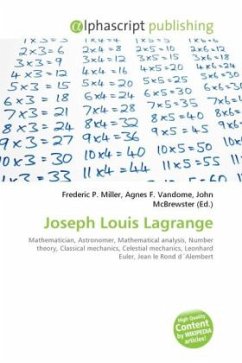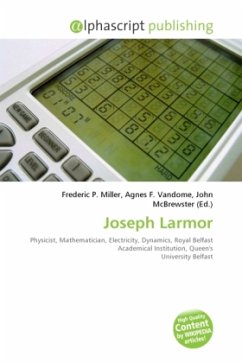
Joseph Louis Lagrange
Versandkostenfrei!
Versandfertig in 6-10 Tagen
49,99 €
inkl. MwSt.

PAYBACK Punkte
25 °P sammeln!
High Quality Content by WIKIPEDIA articles! Lagrange (25 January 1736 10 April 1813), born Giuseppe Lodovico Lagrangia, was an Italian-born mathematician and astronomer, who lived part of his life in Prussia and part in France, making significant contributions to all fields of analysis, to number theory, and to classical and celestial mechanics. On the recommendation of Euler and D'Alembert, in 1766 Lagrange succeeded Euler as the director of mathematics at the Prussian Academy of Sciences in Berlin, where he stayed for over twenty years, producing a large body of work and winning several priz...
High Quality Content by WIKIPEDIA articles! Lagrange (25 January 1736 10 April 1813), born Giuseppe Lodovico Lagrangia, was an Italian-born mathematician and astronomer, who lived part of his life in Prussia and part in France, making significant contributions to all fields of analysis, to number theory, and to classical and celestial mechanics. On the recommendation of Euler and D'Alembert, in 1766 Lagrange succeeded Euler as the director of mathematics at the Prussian Academy of Sciences in Berlin, where he stayed for over twenty years, producing a large body of work and winning several prizes of the French Academy of Sciences. Lagrange's treatise on analytical mechanics (Mécanique Analytique, 4. ed., 2 vols. Paris: Gauthier-Villars et fils, 1888-89), written in Berlin and first published in 1788, offered the most comprehensive treatment of classical mechanics since Newton and formed a basis for the development of mathematical physics in the nineteenth century












